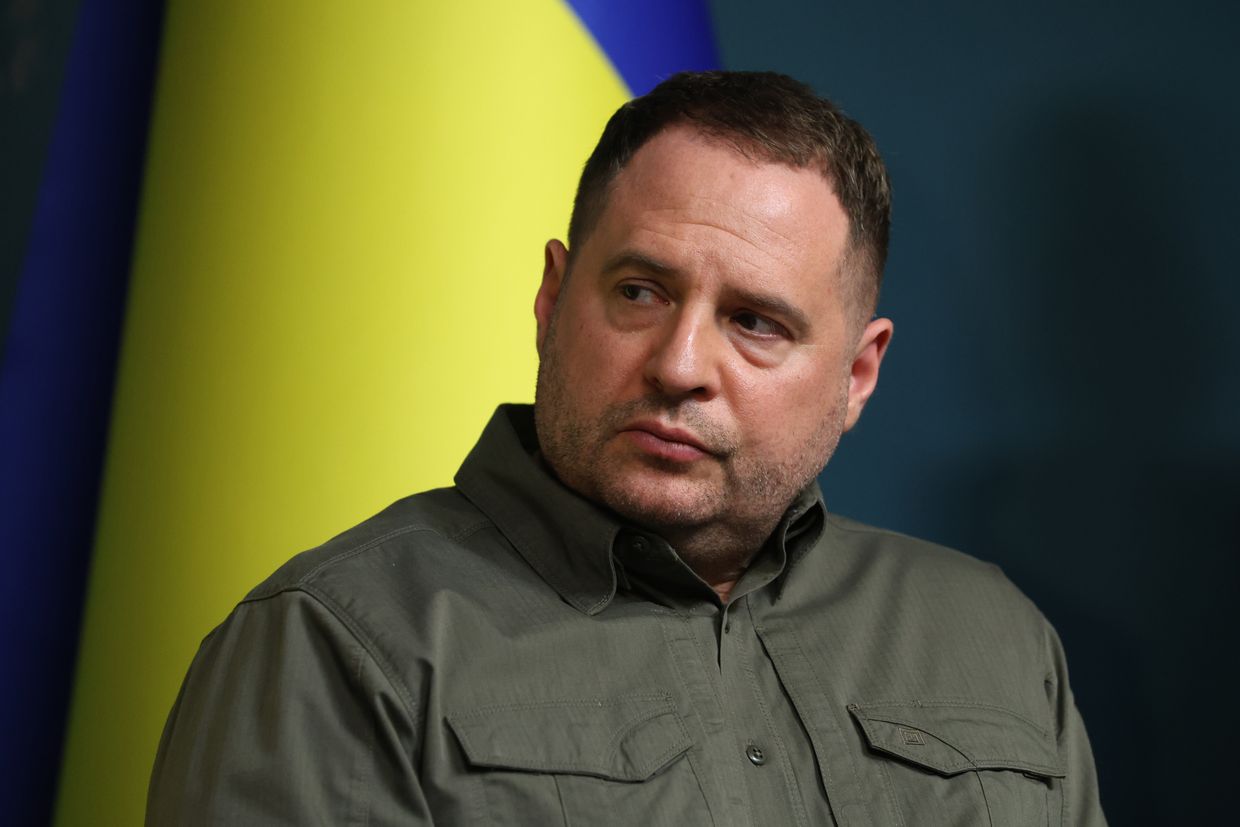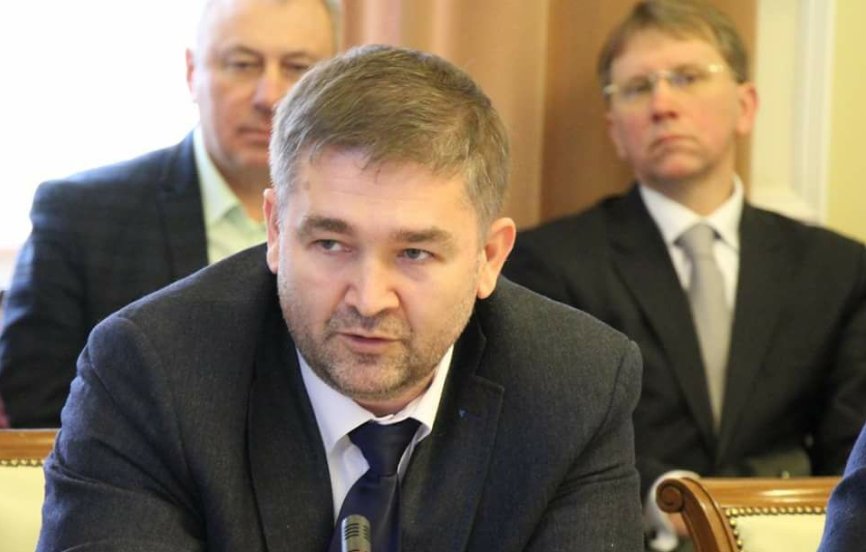New economic watchdog head aims to bust Ukraine's billion-dollar shadow economy

Oleksandr Tsyvinskyi, the director of the Bureau of Economic Security of Ukraine in Kyiv, Ukraine, on Sept. 9, 2025. (Danylo Pavlov / The Kyiv Independent)
The new head of Ukraine's economic crimes bureau wants to transform an agency with a reputation for bribery, blackmail, and extortion into a weapon against Ukraine's $14.5–$24.4 billion shadow economy.
But Oleksandr Tsyvinsky — who led high-risk cases as a detective at the National Anti-Corruption Bureau (NABU) for a decade, including against the son of infamous ex-Interior Minister Arsen Avakov — knows he will be up against powerful forces as the new chief of the Economic Security Bureau.
Ukrainian businesses have long accused the bureau — in charge of economic crimes like tax evasion — of behaving like a financial mafia, while activists say it is unofficially under the thumb of Oleh Tatarov, the controversial deputy head of the Presidential Office who oversees law enforcement. Tsyvinsky’s leadership will test Kyiv’s will to reform the bureau and its commitments to EU accession.
"Rebooting the bureau will irritate some people. An effective bureau will mean illegitimate businesses will lose a lot of money," he told the Kyiv Independent in an interview in early September.
"In a month, or a month and a half, we'll see whether there is political will for the bureau to work."
Tsyvinsky took the reins of the agency on Aug. 6, after a lengthy standoff with the government that controversially tried to block his appointment. Weeks before, the parliament moved to curb the independence of anti-corruption agencies, including NABU, but U-turned after pressure from mass protests and international partners.
The fight against corruption starts internally: paying employees a good wage to deter bribery, enforcing strict punishments, and developing a whistleblower institution, Tsyvinsky said.
The parliament’s crackdowns came as law enforcement closed in on high-profile politicians over the summer, including Deputy Prime Minister Oleksii Chernyshov, who is seen as close to President Volodymyr Zelensky. The president’s circle has loyal members within the bureau, and Tsyvinsky could threaten that balance, said Daria Kaleniuk, executive director of the Anti-Corruption Action Center, a watchdog.
"The authorities will try to keep the people they control inside the bureau,” Kaleniuk told the Kyiv Independent.
“The question is whether Tsyvinsky will manage to vet candidates and hire new blood with high integrity and professionalism without firing everybody."
New mindset
Tsyvinsky says his dogma is simple — if you break the law, you will face justice. No one is untouchable, he says, and the bureau will target those at the top of the schemes rather than the middlemen like the drivers who transport smuggled goods.
"The inevitability of punishments is the best prevention," he said.
"I won’t aim for 100 cases. Let it be seven or 10, but they will be significant. Those that allow us to change the system."
Tsyvinsky’s first priority for the reformed bureau is finding a good team. He has already started scrubbing the bureau from the inside out, with 41 people fired or quitting the team since August.
The previous chief, Vadym Melnyk, led the bureau from its inception in 2021 until April 2023, when he stepped down amid a myriad of controversies, including a detective embroiled in a gambling ring.
The fight against corruption starts internally: paying employees a good wage to deter bribery, enforcing strict punishments, and developing a whistleblower institution, Tsyvinsky said. He wants to end bribery among employees, but admits that he can’t eliminate corruption completely.

With a reliable team, Tsyvinsky can steer the bureau away from corporate shakedowns to eliminating shadow businesses. The long-term plan is to build a centralized database with data from the tax and customs services, the Finance Ministry, and other registers to map out anomalies in the economy.
"I won’t aim for 100 cases. Let it be seven or 10, but they will be significant. Those that allow us to change the system."
For example, the data shows that cigarette sales in Kyiv have dropped — but Tsyvinsky doesn’t put that down to successful anti-smoking campaigns. It’s because smuggled and counterfeit cigarettes have steadily increased to over 16% of the market this year.
The Ukrainian public is used to buying cheap counterfeit and smuggled goods — a third of coffee is smuggled in — so communication is key. People need to realize that not paying tax or buying smuggled goods steals from the state budget, and in turn, from the military, Tsyvinsky said.
"If the budget doesn't receive money, then there are more chances to lose our territory," he said.
Reform challenges
Tsyvinsky’s ambitions are hampered by two key problems: people and money. The bureau’s budget is just 1.94 billion hryvnia ($47 million), and despite Tsyvinsky asking the government for more, it will be the same again next year.
The bureau can’t open new offices on the shoestring budget, nor can it launch Tsyvinsky’s database scheme. It also makes it harder to hire employees, as the paltry salaries are 60% less than those of other agencies like NABU.
Over the next six months, Tsyvinsky will be swamped with vetting and hiring new people, said Kaleniuk. The bureau only has 1,244 employees out of the 4,000-person capacity, while Ukraine’s workforce deficit won’t make it easy to find new staff. As a result, Kaleniuk doesn’t expect remarkable investigation results in the first year or so.
But Tsyvinsky isn’t deterred from leading the bureau, even though he expects some in power will try to obstruct its work by restricting cases and information. If the bureau starts probing those aligned with the President’s Office, Tsyvinsky risks being fired, said Yaroslav Zhelezniak, an opposition lawmaker from the Holos Party.
"They could make changes to the budget, to legislation, or start criminal cases against Tsyvinsky’s people," Zhelezniak told the Kyiv Independent.
Those powerful figures could also use Prosecutor General Ruslan Kravchenko, seen as loyal to the Zelensky administration, who has overarching influence over the bureau’s investigations, said Kaleniuk. The bureau’s cases fall under the jurisdiction of the Prosecutor General's Office, and Kravchenko can appoint or demote prosecutors and instruct them to give orders to the bureau’s detectives.

Without reforming the Prosecutor General’s Office, the bureau will be vulnerable to coercion, no matter who is at the helm. For now, the government is dawdling around the reforms, despite them being key to EU accession.
"There will always be ways to control the bureau’s investigations through prosecutors. If the Prosecutor General — whether instructed by the President, Presidential Office Head Andriy Yermak, or others — wants to block a specific investigation, they can make it happen,” said Kaleniuk.











